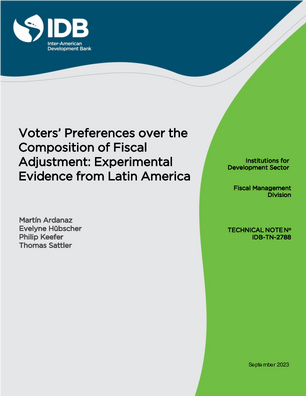Voters’ Preferences over the Composition of Fiscal Adjustment: Experimental Evidence from Latin America
Date
Sep 2023
Despite the regularity with which governments confront the need to make fiscal adjustments, voter attitudes toward competing consolidation strategies are still not well understood. For example, an influential literature finds that voters prefer public spending cuts to tax increases, but little is known about how these preferences depend on the particular taxes and spending categories that politicians choose or on voter characteristics such as income, ideology and trust. Our analysis of experimental data from 8,000 survey respondents across Brazil, Colombia, Costa Rica, and Peru confirms that, at the aggregate level, individuals prefer spending-based to tax-based fiscal adjustments. However, these preferences change dramatically depending on which tax and spending adjustments individuals are asked to make. Respondents strongly oppose increases in the personal income tax, but they support or are indifferent toward higher corporate income or value-added taxes. They strongly support public employment cuts but oppose cuts in social assistance. Responses also indicate that a wide range of voter motivations, beyond their pecuniary interests, shape their preferences over fiscal adjustment strategies. Their support not only varies with income, but significantly depends on such non-pecuniary characteristics as ideology and trust in government.




